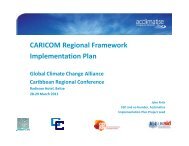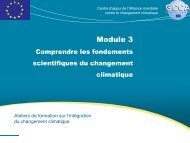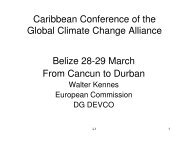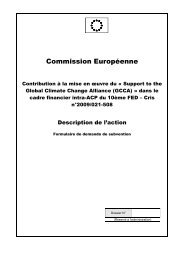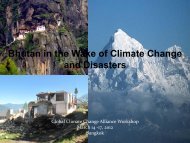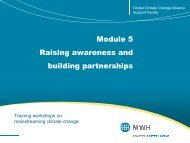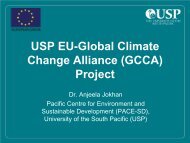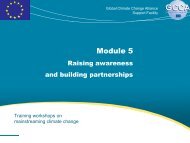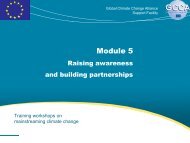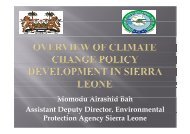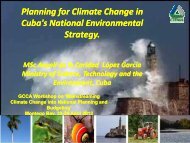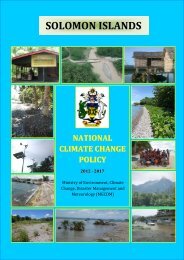Rwanda Green Growth Strategy 18nov11 - Global Climate Change ...
Rwanda Green Growth Strategy 18nov11 - Global Climate Change ...
Rwanda Green Growth Strategy 18nov11 - Global Climate Change ...
Create successful ePaper yourself
Turn your PDF publications into a flip-book with our unique Google optimized e-Paper software.
Detailed Programmes of ActionProgramme 1: Sustainable Intensification of AgricultureResponsible Stakeholders (lead in bold)MINAGRI, MININFRA, Municipal Authorities, ISAR, Private Sector, NGOs, REMASummary of Programmes and ActionsIn <strong>Rwanda</strong>, average farm size is small at 0.7 of a hectare. The sustainable intensification of small-scaleagriculture is a key component in building a low carbon and climate resilient agricultural sector. Adaptation,mitigation and agricultural development options can be designed and implemented to counter the negativeimpacts from climate change and reduce the sectors dependency on fossil-fuels, thus building resilienceinto agricultural ecosystems. When small-scale production is intensified through agroecology techniquesincluding agroforestry, kitchen gardens, nutrient recycling and water conservation to maximise sustainablefood production, the aggregate benefit of small-holdings can be considerable and substantially contribute tonational food security. Additional aggregate benefits include improved environmental sanitation, and disasterrisk reduction (slope stabilization/flood mitigation) all leading to climate compatible development. Action 1: Mainstreaming of Agroecology<strong>Rwanda</strong> will mainstream agroecology in the agriculture intensification programme and other naturalresource-based livelihood programmers. This action will focus particularly on the Land husbandry, Waterharvesting and Hillside irrigation Project (LWH); Integrated Water Resource Management (IWRM) (irrigatedrice production); and the One Cow Program to maximise adaptation and mitigation capacity, and buildagricultural diversity in current farming systems though an integrated approach to farm design. Action 2: Resource Recovery and Reuse<strong>Rwanda</strong> will promote recovery and reuse of both organic waste and wastewater. Recycling organic waste isa critical adaptation and mitigation strategy. It improves soil fertility and structure, as compost increases soilwater retention and nutrition supply to crops; and it diverts organic waste from waste dumps and landfillsites reducing methane emissions. Wastewater irrigation allows increased food production in urban andperi-urban agriculture during periods of rainfall scarcity. Consequently, urban-regional planning is required toensure suitable peri-urban areas are identified and maintained as potential agricultural sites forimplementation of wastewater irrigation during possible periods of food insecurity due to rainfall scarcity. Action 3: Fertiliser Enriched CompostThe agricultural intensification programme in <strong>Rwanda</strong> is currently dependent on the application of inorganicfertiliser to increase crop yields, although these external inputs produce GHG emissions through the fertilisermanufacturing process and the transportation of fertiliser products. However demand for inorganic fertiliserscan be reduced by applying an integrated approach to soil fertility and nutrient management, which employsagroecology, resource recovery and reuse, and fertiliser enriched composts. An integrated approach cansignificantly lower inorganic fertiliser demand, reduce GHG emissions and increase farm profitability due toreduced input costs for farmers. Such approaches also improve soil structure and the water retentioncapacity of soils leading to resilient agricultural ecosystems and sustainable food security. <strong>Rwanda</strong> willpromote the use of fertiliser enriched compost. This technique will ensure a more efficient use of inorganicfertilisers, and will add valuable organic matter to soils, which also maximises terrestrial carbon in farm soils. Action 4: Mainstreaming of “Push-Pull” Strategies (IPM)“Push-pull” strategy is a sustainable pest management technique that incorporates a cropping systembased on producing multiple crop and fodder yields but which is also designed to control plant parasitesand pathogens such as stemborers and striga weed. <strong>Rwanda</strong> will implement a push-pull system usingNapier grass and desmodium legume to manage pests in fields of maize, sorghum, millets and rain-fed rice.“Push-pull” strategies increase maize yield, fix nitrogen into farm soils and provide a continuous supply ofcattle fodder from the harvest of Napier grass and desmodium, which improves milk yields of cattle whilealso reducing methane emission due to improved fodder regimes.56Government of <strong>Rwanda</strong>



